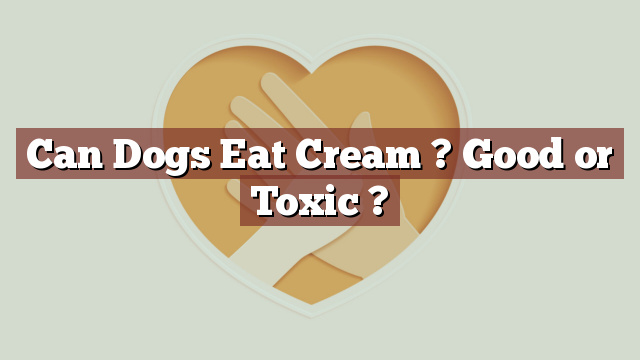Can Dogs Eat Cream? Good or Toxic?
Can dogs eat cream? This is a question that many dog owners may have. As responsible pet owners, it is important for us to know what foods are safe for our furry friends. While dogs can digest certain human foods, not all foods are suitable for their consumption. In this article, we will explore the safety and potential risks associated with feeding cream to dogs.
Nutritional Value of Cream for Dogs: Is it Safe to Feed?
Cream is a dairy product that is high in fat content. It is made by separating the high-fat layer from milk. Although cream contains essential nutrients such as vitamins A, D, and E, as well as calcium, it is not a necessary component of a dog’s diet. Dogs are primarily carnivorous animals and their nutritional needs differ from humans.
Can Dogs Eat Cream? Exploring Safety and Toxicity Risks
Dogs can eat cream in moderation, but it is important to note that some dogs may have difficulty digesting dairy products. Like humans, dogs can be lactose intolerant, which means they lack the necessary enzyme to break down lactose, the sugar found in milk and dairy products. Feeding cream to a lactose-intolerant dog can lead to gastrointestinal issues such as diarrhea, vomiting, and abdominal discomfort.
Furthermore, the high fat content in cream can lead to pancreatitis in dogs. Pancreatitis is a condition characterized by inflammation of the pancreas and can cause severe abdominal pain, loss of appetite, and other digestive issues. It is important to consider these risks before deciding to feed cream to your dog.
Potential Risks and Benefits of Feeding Cream to Dogs
Feeding cream to dogs can pose potential risks, as mentioned earlier. However, there may be some benefits associated with small amounts of cream in a dog’s diet. Cream is a good source of calories, and adding a small amount to a dog’s food can be beneficial for those who need to gain weight. Additionally, the vitamin content in cream can provide some nutritional value. However, it is important to consult with a veterinarian before incorporating cream into your dog’s diet to ensure it is suitable for their specific health needs.
My Dog Ate Cream. What Should I Do? Steps to Take
If your dog has ingested cream, it is important to observe their behavior and monitor for any signs of digestive discomfort. If your dog experiences diarrhea, vomiting, or any other adverse symptoms, it is best to contact your veterinarian for guidance. They may recommend withholding food for a short period of time or provide medication to alleviate the symptoms.
Conclusion: Understanding the Risks and Making Informed Decisions
In conclusion, while it is generally safe for dogs to eat cream in moderation, it is important to consider the potential risks associated with it. Dogs can be lactose intolerant and the high fat content in cream can lead to digestive issues and pancreatitis. Before introducing any new food into your dog’s diet, it is always best to consult with a veterinarian to ensure it is safe and suitable for their individual needs. By making informed decisions about what we feed our furry friends, we can help ensure their health and well-being.
Thank you for investing your time in exploring [page_title] on Can-Eat.org. Our goal is to provide readers like you with thorough and reliable information about various dietary topics. Each article, including [page_title], stems from diligent research and a passion for understanding the nuances of our food choices. We believe that knowledge is a vital step towards making informed and healthy decisions. However, while "[page_title]" sheds light on its specific topic, it's crucial to remember that everyone's body reacts differently to foods and dietary changes. What might be beneficial for one person could have different effects on another. Before you consider integrating suggestions or insights from "[page_title]" into your diet, it's always wise to consult with a nutritionist or healthcare professional. Their specialized knowledge ensures that you're making choices best suited to your individual health needs. As you navigate [page_title], be mindful of potential allergies, intolerances, or unique dietary requirements you may have. No singular article can capture the vast diversity of human health, and individualized guidance is invaluable. The content provided in [page_title] serves as a general guide. It is not, by any means, a substitute for personalized medical or nutritional advice. Your health should always be the top priority, and professional guidance is the best path forward. In your journey towards a balanced and nutritious lifestyle, we hope that [page_title] serves as a helpful stepping stone. Remember, informed decisions lead to healthier outcomes. Thank you for trusting Can-Eat.org. Continue exploring, learning, and prioritizing your health. Cheers to a well-informed and healthier future!

